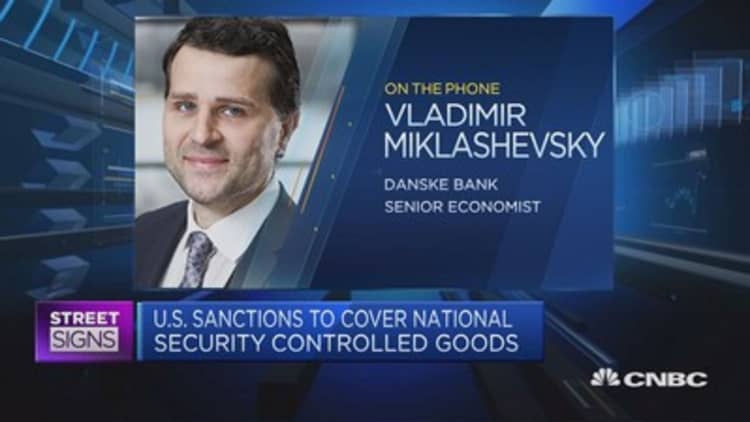Russia's ruble is tanking and markets are shaky on the news of fresh U.S. sanctions over Moscow's alleged poisoning of an ex-spy in Britain.
The State Department announced Wednesday that the sanctions would be handed down for what it determined was Russia's use of a chemical agent, Novichok, to poison former Russian spy Sergei Skripal and his daughter Yulia in Salisbury, England, in March.
Fears of further sanctions sent the ruble down 3 percent on Wednesday. The dollar hit its highest level against the ruble since November 2016, with one dollar buying as many as 66.7099 rubles on Thursday morning. The greenback is up 5.8 percent against the Russian currency since the end of July, and up 14.6 percent since the start of this year. The ruble recovered slightly from its low to 65.8750 at 12:45 p.m. Moscow time (5:45 a.m. ET).
Moscow's dollar-denominated RTS, an index of 50 Russian stocks traded on the Moscow exchange, is down 2.14 percent, with financials and industrials hardest hit so far, both down more than 2.6 percent. Russian's flagship airliner Aeroflot has fallen by 4 percent and state bank VTB is down by 3.9 percent. Russian banks have been listed as targets of various U.S. sanctions bills currently being floated in Congress.
The ruble-denominated benchmark MOEX was less affected, down roughly half a percentage point at time of writing. Russian sovereign dollar bonds fell across the curve, with the yield on Russia's 10-year bond at a year-high of 8.08 percent. Bond prices move inversely to yields.
The sanctions, which will impact Russian exports of electronics and other national security-controlled equipment, will go into effect around August 22, according to the State Department. The decision was triggered by the U.S. government's conclusion that the Kremlin violated a 1991 international law against chemical and biological warfare.

Moscow has strongly denied involvement in the Skripal attack and called the latest move by Washington "draconian" and based on "far-fetched accusations." Russia's embassy in the U.S. stated that it continued to "strongly stand for an open and transparent investigation into the crime committed in Salisbury."
Kremlin spokesman Dmitry Peskov responded to the news Thursday afternoon, calling the sanctions "absolutely unfriendly" and "illegal", but added that Moscow continued to hope for improved U.S.-Russia relations.
President Donald Trump has so far not commented on the developments, which come just a few weeks after his controversial summit with Russian President Vladimir Putin in Helsinki, Finland. During that meeting, he appeared to support his counterpart's claim that Russia did not meddle in the 2016 U.S. election, while America's intelligence agencies believe with unanimous certainty that it did. He later walked back his statements.
Observers say the summit, which elicited a wave of backlash from both allies and opponents of the president, has spurred congressional action on developing a sanctions bill to deter future Russian interference and malicious cyber activities.
A bipartisan group of senators led by South Carolina Senator Lindsey Graham recently introduced the Defending American Security from Kremlin Aggression Act (DAKSAA) of 2018, a sweeping package meant to be more punitive than previous sanctions legislation, although it will likely require months of debate and amendment before final votes could codify it into law.


